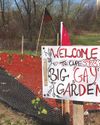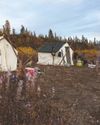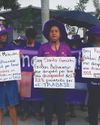In June 2018, six people at the Justice For Our Stolen Children Camp were arrested by Regina police.

Videos showed police officers physically carrying non-violent protesters by their arms and legs out of the tipis that had been set up in Wascana Centre. The camp was established by Indigenous protesters demanding justice for the deaths of Colten Boushie and Tina Fontaine, as well as shedding light on systemic racism in the child welfare and criminal justice systems.
At the camp’s height, 15 tipis stared defiantly up at the Saskatchewan legislature. The camp hosted powwows, feasts, soccer games, book launches, and vigils. And while the camp lay on Treaty 4 territory – the homeland of the Métis Nation and the original lands of the Cree, Ojibwe, Saulteaux, Dakota, Nakota, and Lakota – it also sat on Wascana Centre, an urban park operated by the Saskatchewan provincial government in conjunction with the City of Regina and the University of Regina. The Provincial Capital Commission and Regina police said they were concerned about park visitor safety, and that the camp violated park bylaws that banned overnight encampment, fires, and unofficial signage. In July, radio talk show host John Gormley called the protest an excuse for “free camping” – an accusation that played to racist stereotypes of freeloading Indigenous people.
هذه القصة مأخوذة من طبعة March/April 2019 من Briarpatch.
ابدأ النسخة التجريبية المجانية من Magzter GOLD لمدة 7 أيام للوصول إلى آلاف القصص المتميزة المنسقة وأكثر من 9,000 مجلة وصحيفة.
بالفعل مشترك ? تسجيل الدخول
هذه القصة مأخوذة من طبعة March/April 2019 من Briarpatch.
ابدأ النسخة التجريبية المجانية من Magzter GOLD لمدة 7 أيام للوصول إلى آلاف القصص المتميزة المنسقة وأكثر من 9,000 مجلة وصحيفة.
بالفعل مشترك? تسجيل الدخول

PLATFORMS FOR PEOPLE, NOT PROFIT
Digital platforms boast that they’ve “democratized” cultural production. But what would truly democratic platforms look like in Canada?

ORGANIZING THROUGH LOSS IN THE HEART OF OIL COUNTRY
The story of climate justice organizing in Alberta, at the heart of the tarsands, is the story of a group of young activists learning what it means to lose, and keep on fighting

GROWING THE LABOUR MOVEMENT
How unions are using community gardens to engage members, nourish communities, and help strikers weather the picket line

A NEW ERA FOR OLD CROW
In the Yukon’s northernmost community, the Vuntut Gwitchin First Nation is reckoning with how to preserve their land and culture, amid a warming climate and an influx of tourists

“At Least Hookers Get Wages”
The risky business of sex work in the gig economy

The Literal – And Literary – Futures We Build
Briarpatch editor Saima Desai talks to two judges of our Writing in the Margins contest about Idle No More and MMIWG, ethical kinship, writing queer sex, and their forthcoming work.

The Cost Of A T-Shirt
In Honduras, women maquila workers are fighting back against the multinational garment companies that they say are endangering their health and safety.

Milking Prison Labour
Canada’s prison farms are being reopened. But when prisoners will be paid pennies a day, and the fruits of their labour will likely be exported for profit, there’s little to celebrate.

Bringing Back The Beat
In mainstream media, labour journalism has been replaced by financial reporting and business sections. But journalism students are raising the labour beat from the grave.

There's No Journalism On A Dead Planet
Corporate media owners are killing local newspapers – which is making it impossible for everyday people to understand the on-the-ground impacts of the climate crisis